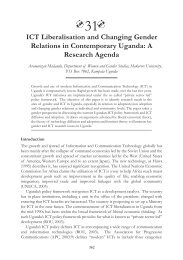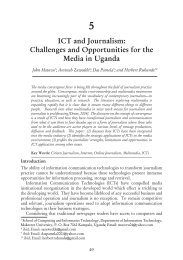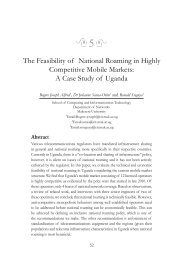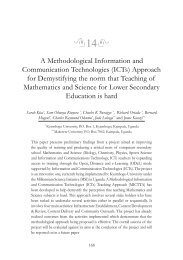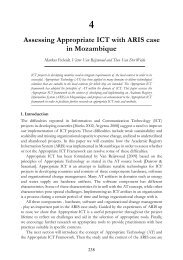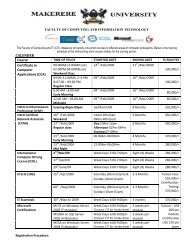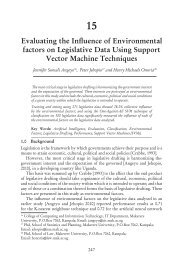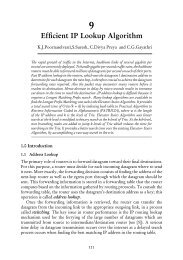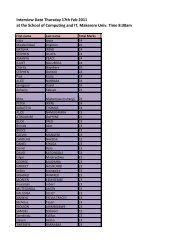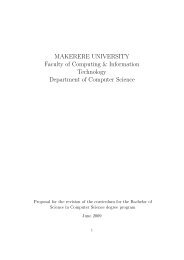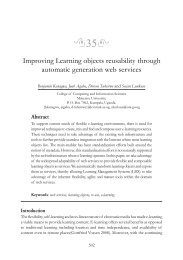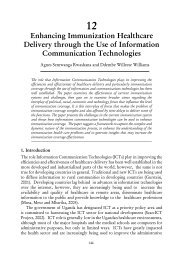Job Mashapa1, Darelle van Greunen2, Alida Veldsman3 and ...
Job Mashapa1, Darelle van Greunen2, Alida Veldsman3 and ...
Job Mashapa1, Darelle van Greunen2, Alida Veldsman3 and ...
You also want an ePaper? Increase the reach of your titles
YUMPU automatically turns print PDFs into web optimized ePapers that Google loves.
106 Strengthening the Role of ICT in Development<br />
Research Significance <strong>and</strong> Future Work<br />
The South African government <strong>and</strong> various stakeholders are investing in rural<br />
development through the use of ICTs. While these developments are the hype, there<br />
is noticeably, a greater failure rate of the projects [Heeks, 2002; Beeharry & Schneider,<br />
1996; Benjamin, 2001; Robey <strong>and</strong> Boudreau 1999].<br />
The proposed model will unmistakably benefi t ICT projects’ implementation in<br />
the developing countries rural context. The model aims to guide on managing the<br />
change in user experience which results in a positive user experience <strong>and</strong> an overall<br />
acceptance <strong>and</strong> adoption of the ICTs. Another contribution of the research will be in<br />
strategies <strong>and</strong> techniques used to determine the user experience of the rural ICT users.<br />
These strategies may be used by future researchers in implementing <strong>and</strong> managing user<br />
experience of the ICT users.<br />
The initial model has not been tested. To refi ne the model we will evaluate the<br />
impact <strong>and</strong> outcome of the change initiative. We need to examine how the people are<br />
utilizing the available resources. Thus future work includes implementing reinforcement<br />
of change, consolidation of lessons learnt <strong>and</strong> an impact <strong>and</strong> outcome assessment. The<br />
model still has to be applied in multiple rural communities implementing ICTs to not<br />
only refi ne the model but to show its applicability. Expert based opinions will be used<br />
to validate the credibility of the model.<br />
The challenges faced include that we had limited time to interact with the ICT<br />
users in the community <strong>and</strong> get feedback on their experiences with ICT usage. Another<br />
challenge is that we piloted the components of the model in a centre that was already<br />
established, thus we could not monitor change during the ICT implementation. There<br />
was a language barrier which was overcome by asking the participants to do translations<br />
when required.<br />
Conclusion<br />
The purpose of this paper was to explore the components of a model for managing<br />
user experience change as a result of using ICTs in a typical rural context. The initial<br />
model components are based on an underst<strong>and</strong>ing that change management has to<br />
be context specifi c, people centred <strong>and</strong> based on individual’s willingness to change.<br />
The current context of change has to be scanned before the ICTs are implemented.<br />
User requirements should be considered from the onset of the project <strong>and</strong> their user<br />
experience managed throughout <strong>and</strong> after the implementation of the ICTs. Such an<br />
approach promotes acceptance <strong>and</strong> usage of the ICTs. We applied the initial model in<br />
a pilot study <strong>and</strong> the provisional fi ndings indicated the model to be applicable in the<br />
rural context.<br />
References<br />
ATTWOOD, H., & BRAATHEN, E. 2010. Telecentres <strong>and</strong> poor communities in South Africa: What<br />
have we learnt? The Chronic Poverty Research Centre (CPRC) Conference. Manchester, UK.



